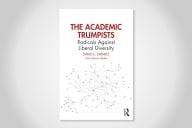You have /5 articles left.
Sign up for a free account or log in.
Those awaiting the National Labor Relations Board’s decision regarding an adjunct union bid at Pacific Lutheran University knew that it would have significant implications for those trying to form collective bargaining units at religiously affiliated colleges and universities; such institutions often successfully challenge union bids based on religious grounds.
But when the pro-union Pacific Lutheran decision finally arrived in late 2014, it came with a twist that appeared to possibly pave the way toward full-time faculty and even tenure-line faculty unions at private colleges and universities, against which there is also a long-standing legal precedent. In addition to new guidelines to determine whether or not a college is sufficiently religious in nature to exempt it from NLRB oversight, the decision also included new guidelines to determine whether faculty jobs are managerial enough to preclude full-time or even tenure-line faculty members from unionizing. It was something of a shock to many private colleges that assumed they could reject collective bargaining.
In short, the NLRB said colleges and universities couldn’t block faculty unions just because they were religious in nature -- colleges seeking to block unions had to prove their missions conflicted with collective bargaining. And the colleges and universities couldn’t just say tenure-line faculty members were managers and therefore precluded from collective bargaining -- they had to show it.
But the Pacific Lutheran decision may not be as promising to union-minded faculty members as it first appeared. In the first major test of the new managerial guidelines regarding full-time faculty members, a regional NLRB office denied a bid by tenure-line faculty members at Carroll College, in Montana, to form a union affiliated with the National Education Association and the American Federation of Teachers. And in contrast to a recent string of regional NLRB approvals of adjunct union bids at religious institutions, the Carroll decision backed the college’s claim that its Roman Catholic identity put it outside NLRB jurisdiction.
“We are disappointed,” said Kay Satre, a professor of English at Carroll and a spokeswoman for the proposed bargaining unit. Noting that the Pacific Lutheran decision was a major factor behind the drive, she added, “We were hopeful that the NLRB was going to rule in our favor, but we also knew that it was going to be challenging.”
In its Pacific Lutheran decision, the NLRB said that to determine whether faculty members have managerial authority, one must examine faculty control of academic programs, enrollment management policies, finances, academic policies, and personnel policies and decisions. It stipulated that “greater weight” be given to the first three concerns. That was significant because many private college administrators say they defer to faculty members in curricular matters but not necessarily enrollment and finances. And it stands in contrast to the 1980 U.S. Supreme Court decision Yeshiva v. NLRB, in which the court determined that tenure-line faculty members are de facto managers and therefore not entitled to collective bargaining. That decision hasn't sat well with many union backers, including some members of the NLRB, who over the years have said that Yeshiva was based on a set of facts at a time when private college faculty members had much more power than they do now.
The Carroll decision, issued by Ronald K. Hooks, a Seattle-based NLRB officer, says that the college met its burden of establishing that faculty members exercise managerial authority with regard to academic programs and policy and personnel matters. Addressing the Pacific Lutheran guidance on weighting factors, Hooks wrote that that decision “does not provide clarity as to which types or numbers of factors a party must prove in order to meet its burden,” and that the academic and personnel factors were therefore enough. Hooks paid particular attention to the fact that tenure-line faculty, through relevant committees and a Faculty Assembly, make decisions involving the college’s curricula, major, minor and certificate offerings and their requirements. Although there was evidence that administrators at times made decisions contrary to faculty recommendations, he said, it wasn’t enough to override faculty input. Regarding personnel matters, he said, faculty members are responsible for hiring and promoting their peers, with minimal administrative influence.
Regarding a college’s religious identity, the Pacific Lutheran decision was less prescriptive to avoid what the NLRB called “trolling” an institution’s operation. But it said that it extended the “‘holding out’ principle to our analysis of faculty members’ roles; that is, we shall decline [NLRB] jurisdiction if the university ‘holds out’ its faculty members, in communications to current or potential students and faculty members, and the community at large, as performing a specific role in creating or maintaining the university’s religious purpose or mission.”
In other words, it said, “Faculty members who are not expected to perform a specific role in creating or maintaining the school’s religious educational environment are indistinguishable from faculty at colleges and universities which do not identify themselves as religious institutions and which are indisputably subject to the board’s jurisdiction. Both faculty provide nonreligious instruction and are hired, fired and assessed under criteria that do not implicate religious considerations.” That’s in contrast to the 1979 Supreme Court case NLRB v. Catholic Bishop of Chicago, which established a legal precedent against faculty unions in religious schools.
In the Carroll decision, Hooks wrote that on many levels, the proposed unit would pass the Pacific Lutheran test. Faculty members don’t have to be Catholic to teach or be promoted at the college, for example, and its mission in fact encourages diversity of thought. Professors are academic advisers and not spiritual advisers, he said. But Hooks cited testimony that faculty members could be subject to discharge for “continued, serious disrespect or disregard for the Catholic character or mission” of the college, as described in the faculty handbook.
Satre said that she was surprised that Hooks’s decision, at least regarding the religious standards, appeared to hinge so much on that testimony. She said there was only one case, over a decade ago, in which the college had acted against a professor on those grounds.
But Hooks’s decision notes that even if he were to reject the college’s religious argument, “I would nevertheless dismiss the instant petition as the unit faculty are managers within the meaning” of the National Labor Relations Act.
William Herbert, executive director of the National Center for the Study of Collective Bargaining in Higher Education and the Professions at Hunter College of the City University of New York, called the decision an “interesting one.”
“This is the first post-Pacific Lutheran University decision to apply the refined standards for managerial status to tenured and tenure-track faculty,” he said. Prior regional director decisions have applied the refined standards favorably to adjunct faculty in proposed units at Duquesne University, Manhattan College, Saint Xavier University and Seattle University, he said. That is, those colleges did not meet the burden of proof regarding their religious identity, insofar as they would preclude unions on campus.
Carroll, which had opposed the drive on religious grounds and by saying that it feared third-party intervention in campus dialogues, took the decision as a victory.
“By recognizing the fact that the petitioned-for faculty are managerial in many key areas of the college, the NLRB acknowledges the crucial role the faculty have in the college’s decision-making structure,” President Thomas M. Evans said in a statement. “The decision also recognizes that because Carroll holds itself out to be a Catholic college and its faculty are held accountable to the Catholic character and mission of Carroll, the NLRB does not have jurisdiction” in the petition.
Evans also said he thought the college would benefit from the experience in the long term. “Through the strengthening of our communications and shared governance, we look forward to creating an even more vibrant college community for our students, faculty and staff -- with academics at the forefront of our shared vision,” he said.
The Association of Catholic Colleges and Universities, which has remained neutral on the issue of unions but has questioned the NLRB for determining whether a college is religious, also responded positively to the news. Paula Moore, a spokesperson for the organization, said the case “appears to be a thoughtful one that is consistent with the existing law regarding the unionization of full-time faculty members at religiously sponsored institutions.”
The decision makes clear that faculty members are “partners with administration in the governance of their institution,” she added via email. “This emphasis on shared governance is very much in the tradition of Catholic social thought.”
Neither Satre or the union knew yet whether they’d file an appeal -- they’re meeting soon to talk about what happens next. Whatever that is, Satre said, “I’m not sorry and I don’t think the other faculty are sorry that we undertook this. I think it was a really good endeavor.”
Satre said the organizing effort increased cross-faculty communication about the issues that matter to them -- primarily working conditions, such as more even distribution of teaching loads.
“The administration has seen very clearly that these aren’t peripheral issues to us, or issues that should be postponed,” she said.









